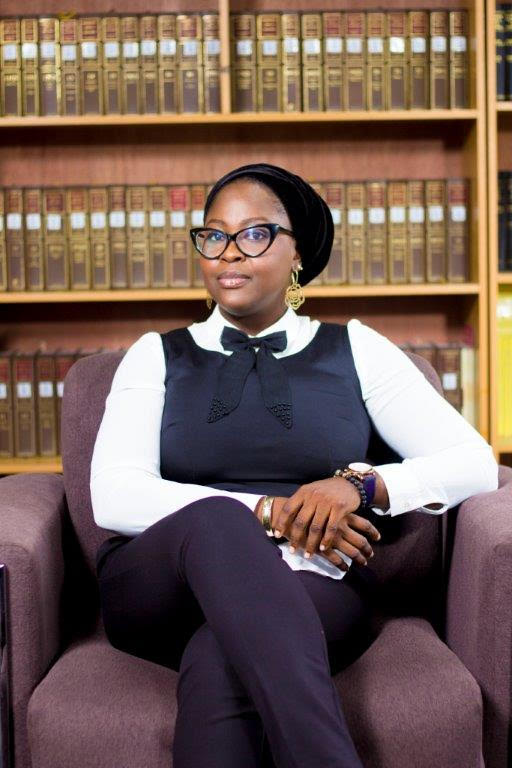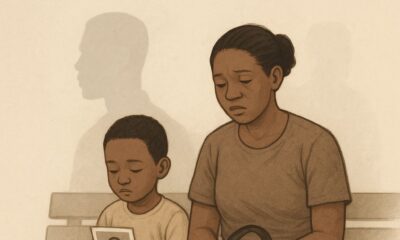Features
Mudrakat Alabi-Macfoy: You Don’t Have To Be Someone’s Mummy
Voluntary childlessness in this part of the world is extremely rare but not impossible. Women do not have to have it all.
 You don’t have to be somebody’s mummy. You don’t have to pretend motherhood is not an exhausting endeavor, especially if you are a single parent. And yes, you can be married and still be a single parent to your child or children.
You don’t have to be somebody’s mummy. You don’t have to pretend motherhood is not an exhausting endeavor, especially if you are a single parent. And yes, you can be married and still be a single parent to your child or children.
Like the evolution of man, the Nigerian society has drawn up its mandatory rites of passage for women to be recognized as successful: education, career, marriage and kids. That is the progression expected. Even when a woman toes the line and gets to the marriage phase, there comes the pressure of having children. You will be surprised by how many people you do not know who apparently have a stake in what goes on in your uterus. God forbid you gain some chopping-the-life-of-your-head weight, that nosy friend or relative is quick to ask if you have “taken in.”
It appears that the life of a woman is not solely hers, she’s not allowed to live and thrive without the shackles of a myriad of expectations.
As a newly married woman in Nigeria, once you set your mind on enjoying a couple of child-free years with your partner, you are quickly reminded about your ticking biological clock. There you are already carrying the heavy burden of perpetuating a whole lineage. You are also expected to be nurturing and maternal because you are female, expected to want to have kids, otherwise you have failed in your femininity. A woman may be without a partner in marriage but if she has a child, she is relatively rescued from being a lost cause – if she is lucky.
But wow, what a time to be alive as a woman today. The evolution is being televised, tweeted about, posted about on Instagram, and most of all, there is accountability for the marginalization women have had to endure for scores of decades. And I am here for all of it. I am also here to tell you that you do not have to be someone’s mummy. This is a decision that is taken way too lightly.
Birthing and raising a whole human being is not beans. Beyond the routine of rites of passage lie two fundamental pillars to your individuality as a woman – your physical health and your mental health. I am here to spark the conversation about the decision of a woman not to have children.
A few months ago, I tried to start a Twitter thread about young Nigerian couples (and individuals) who are opting for voluntary childlessness. I was seeking answers for a research on how they came to this decision as well as how their family took the news. You cannot imagine the response I got. Even I could not imagine the response I got because I got no response. Nada. Zero. Zilch. No one was talking about it, at least not publicly. Expressing unpopular sentiments like this is simply not done in Nigeria. However, there is a public aspect to this conversation, the first of the two pillars mentioned above: the effect of pregnancy on physical health.
Women across social media often share their harrowing childbirth stories and the shocking after-effects of the experience, some of which remain with them for a lifetime, affecting their quality of life. Has your nose returned to its normal size? Does your voice now sound like Barry White? Do you have slight incontinence when you laugh too hard? Or maybe your tummy looks like you are still pregnant. On top of this, you have people that turn up their noses at women who give birth through caesarean section as opposed to the “natural” birth.
Each day as a mother, new or old, brings a unique challenge, yet these people do not appreciate that pregnancies differ from woman to woman. Your self-confidence begins to dip; you begin to compare yourself to other women around you. You think Lady A is lucky because she had her children in her early twenties. You forget the barrelling and overwhelming train of motherhood that can almost undo a young mother. You forget the persistent inconveniences of a milk or vomit stained blouse, soiling of a freshly changed diaper and that loud shrill cry just when you are about to fall asleep.
Maybe to you, these are seemingly “small” things compared to the blessing of a child. However, with the superficial nature of our society, you cannot help but worry about snapping back, looking hot and drinking green tea so your partner (or prospective partners) will still find you desirable. Have you considered the terribly biased origin of the acronym MILF? This is where your mental health takes a bashing. Yet, it is taboo for you to publicly express your regrets of childbirth and of motherhood. Doing so will make you a bad mother. You are afraid that if you say or think any negative thing. It is important to add “…but thank God sha, some people don’t have children and they are suffering. Eeya.” You do not take note of your own suffering.
There are countless studies linking sleep to productivity and overall good health. Every mother knows how precious not having a small child in your face 24/7 (even when you have to go to the toilet) is. All of your choices and decisions are tied to this tiny human forever. Fatigue and burnout is synonymous with motherhood as you navigate your way around a patriarchal setting in society, the workplace and at home.
At this point, I find it necessary to clarify that while there are loads of pros for having children, the message of this piece is to be sure you consider motherhood very carefully. You must have a supportive and progressive partner who understands that there is no such thing as maternal instincts as are paternal instincts. Male partners tend to “opt in” to parenting and are praised a bit too lavishly for it. Men are as capable of being maternal in the same way women are, barring biological constraints. It is the responsibility of your partner to bring himself up to speed on parenting, just as the woman has done. Everything a woman learns on her journey to motherhood is not a default setting by virtue of her vagina. Childcare no longer has to be disproportionately tilted to women.
Unfortunately, a lot of women discover the negative aspects of childbirth and motherhood after the fact. In Nigeria, women are stuck in the shadows and secrets of their mothers. Medical histories are stifled for fear of shame until younger generations have to suffer through the same challenges. In Nigeria, good parenting, physical and mental abuses, are all peas in the same pod. This generation endures deep trauma visited on them by parents who didn’t know better or those who did but figured that such abuse was a necessary factor in curbing natural curiosities like sexual urges. Have you addressed traumas and conflicts from your childhood? Have you unlearned some of the inherited ideas that you have realized serves no positive purpose? Are you mentally competent enough to be a parent? Children are not vehicles for your unrealized dreams, neither are they the only route to a life of fulfillment.
There is a belief that a woman must want to have children. How can she not have children? Well, ask your mother how she did it. Hear her story, if you have not. There is a reason why appreciation for one’s mother skyrockets once you become a parent. There is a powerful sense of community and mutual respect for the sacrifices that come with motherhood, punctuated by beautiful moments of love and pride towards one’s child. Thus, going against the grain of convention in these contemporary times by choosing not to have children is to go against a deeply entrenched expectation in Nigerian societies. It must be said that it is okay for a woman not to conform to the notions traditionally associated with women. For a woman, freedom from childcare means greater opportunities for self-fulfillment in career, finances and personal life.
Voluntary childlessness in this part of the world is extremely rare but not impossible. Women do not have to have it all. Everything in life is a choice; you only have to rise up to it. We can and must choose what is beneficial for our individual physical and mental health, even though it will take an enormous amount of mental fortitude to champion a life that is really and truly your own, a life on your own terms. Women must ask themselves the difficult questions and realize their individual truths. We must disown the shame and refuse to be boxed into the never ending story that is motherhood, if you do not want to be somebody’s mummy. A woman’s choice must always be respected; her reproductive rights must cease to be the ambit of every other person except her own.
Quite frankly, I say the world does not need more children; the world needs more empathy, compassion and love for women, by women and with women.



















